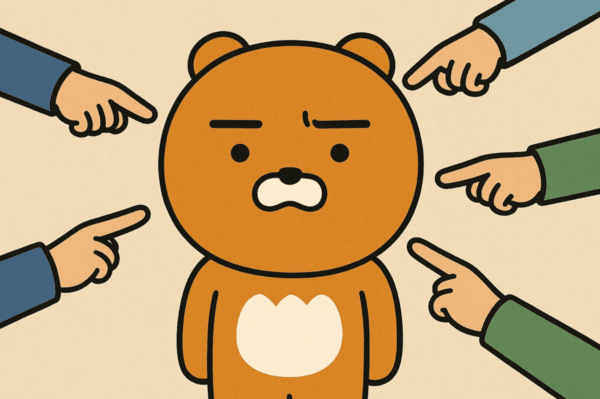The Fatigue of a Near-Monopoly Platform

For years, Kakao was synonymous with everyday convenience in Korea
Calling a taxi, paying for coffee, listening to music, and-above all-staying connected through KakaoTalk were all seamlessly woven into daily life. The platform became an invisible infrastructure that people relied on without question. But once cracks began to appear, emotions shifted just as quickly. At some point, whenever Kakao announced a new feature or update, the public response became, “What now?” The perception of Kakao as Korea’s “ugly duckling” wasn’t born overnight; it was the result of accumulated fatigue.
The trouble began with shaky leadership
Legal risks involving Kakao’s founder raised concerns about corporate integrity and stability-foundational elements for any platform company whose services function as public utilities. The controversy intensified when executives at Kakao Pay sold off large amounts of stock immediately after the company’s IPO. For many users, this cemented the narrative that “the platform serves the public, but insiders serve themselves.” It suggested that private gain outweighed any long-term corporate vision.
Nothing damaged trust more than the 2022 Kakao blackout
A fire at a data center shut down KakaoTalk, taxi-hailing, payments, business communication—essentially everything. It was the day Koreans realized Kakao wasn’t just another private tech company; it had become a national infrastructure. The real blow came not from the outage itself but from the confusion that followed. Delayed communication, unclear responsibility, and uncoordinated recovery efforts left users with a sobering thought: “We’ve entrusted too much to a single company.”
Meanwhile, signs of “platform greed” began to surface across Kakao’s businesses
Controversies erupted over Kakao Mobility’s fee structure, allegations of inflated revenue reporting in Kakao Taxi, speculative play-to-earn ambitions within Kakao Games, and unfair revenue-sharing practices at Kakao Entertainment. These incidents may have occurred in separate business units, but users connected them into a single story:
Kakao always moves in whichever direction makes more money.
In recent months, tension finally reached a breaking point
A notable example was the redesign of the KakaoTalk “Friends” tab. What had always been a deeply personal social space was suddenly crowded with ads, recommendations, and commercial content. Users didn’t see this as a harmless UI update; they saw it as an intrusion into their private communication sphere. When a messaging app becomes the default communication infrastructure for an entire nation, any forced commercialization feels like a breach of trust.
A similar backlash emerged from the redesign of Kakao Map’s location-sharing feature.
What used to be a simple action-sending a location to a friend-became unexpectedly complex. After the redesign, users complained about unnecessary steps and the impression that certain in-app behaviors were being nudged or forced. It felt less like a UI improvement and more like Kakao restructuring basic functionality around its own traffic and revenue logic. As with KakaoTalk, Kakao Map is embedded in everyday routines, so even minor disruptions can feel like unilateral control.
Strategic inconsistency further amplified public frustration.
Government discussions around “sovereign AI” saw Kakao change its stance several times. Frequent organizational reshuffles and unclear long-term goals added to the sense that the company was chasing trends rather than articulating a coherent philosophy. In fields like AI, leadership requires clarity; Kakao’s shifting strategy only heightened user anxiety.
All these incidents point to one fundamental issue.
Kakao has become a company that virtually monopolizes Koreans’ daily communication, mobility, and time-but has not adopted the responsibility or philosophy that such dominance demands. A platform with no meaningful alternatives cannot repeatedly push unilateral updates or commercialization without triggering emotional backlash. When a near-monopoly acts opportunistically, public resentment multiplies.
So how can Kakao rebuild trust?
What the company needs now is not more expansion, but a reset of its basic principles.
First, Kakao must formalize user rights-covering data use, advertising boundaries, and procedures for major feature changes. Second, KakaoTalk and Kakao Map should be operated with the mindset of public infrastructure, not private playgrounds. Third, its technology and AI strategies must be guided by long-term philosophy, not market fashions. Finally, the company must restore ethical standards within its leadership and organization to prevent future trust-eroding incidents.
Kakao may be an “ugly duckling” today.
But this is not an irreversible identity. Ironically, the backlash stems from Kakao becoming too big, too essential. If the company begins to treat people’s daily lives with deeper respect, it can return to being a trusted platform. The path begins not with technology, but with a simple promise:
We will be most careful when touching your everyday life.
Brand curator Columnist yoian@naver.com
- [Column] What Apple’s Post–Tim Cook Era Is Really Worried About…Three Strategic Shifts Signaled by John Ternus’ Rise
- PLAVE Wins KGMA’s “Virtual Artist of the Year”… Setting a New Standard for Korea’s EnterTech Market
- [Tech Column] Is the AI Boom a Bubble in the Making? Michael Burry Targets GPU Depreciation and a $5 Trillion Bet
- “KPop Demon Hunters” Kicks Off Global Pop-Up Tour in Seoul, Announces Asian City Stops
- AI Emerges as the “New Normal” in Cyberattacks... Google GTIG’s 2026 Security Outlook
- Microsoft Ignite 2025: The Age of the AI Turning Point

![[동학] 카카오톡 친구탭, 결국 12월 롤백… “격자형 피드는 선택 옵션으로”](https://cdn.kmjournal.net/news/thumbnail/custom/20251126/5517_10550_1119_1763853080_120.jpg)


![[테크 칼럼] 제미나이3, GPT-5.1을 넘다…AI는 이제 ‘일을 대신하는 시대’로 간다](https://cdn.kmjournal.net/news/thumbnail/custom/20251126/5457_10454_4847_1763621329_120.jpg)



![[낭만 테크 시대] AI 대항해 시대](https://cdn.kmjournal.net/news/thumbnail/custom/20251126/5603_10714_4334_1764121414_160.jpg)

